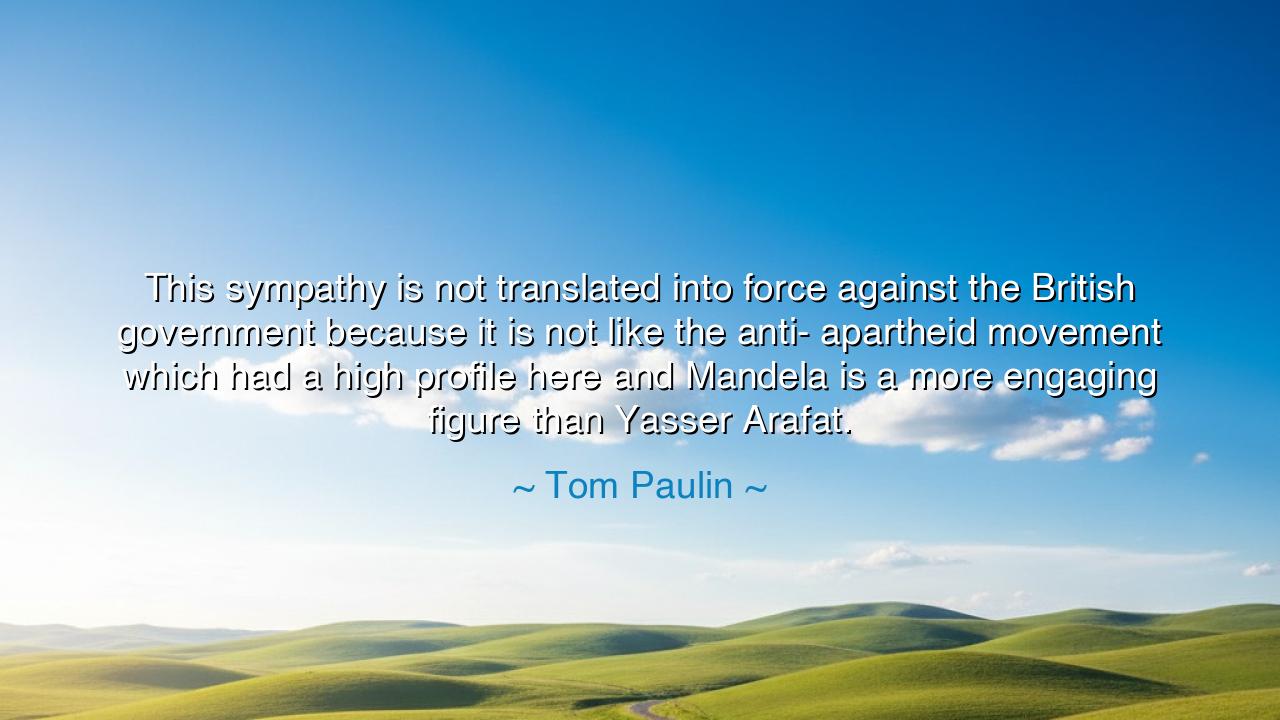
This sympathy is not translated into force against the British
This sympathy is not translated into force against the British government because it is not like the anti- apartheid movement which had a high profile here and Mandela is a more engaging figure than Yasser Arafat.






Hear now the voice of Tom Paulin, poet and critic, whose words shine a torch upon the nature of politics, empathy, and the sway of human figures in the theatre of nations. He declares: “This sympathy is not translated into force against the British government because it is not like the anti-apartheid movement which had a high profile here and Mandela is a more engaging figure than Yasser Arafat.” These words pierce through the veil of sentiment, revealing that sympathy, though powerful, is not always transfigured into action, for action often demands not only a cause but a figure who embodies its spirit.
Paulin speaks of two struggles: one, the cry against apartheid, which echoed across the globe with thunderous force, carried upon the shoulders of Nelson Mandela, whose dignity in suffering and steadfast hope drew the world into his cause. The other, the Palestinian struggle, often associated with Yasser Arafat, who, though a leader of his people, was seen through the prism of conflict, rebellion, and controversy. Paulin points to the truth that the world does not respond equally to all cries of injustice. The vessel that carries the plea, the face that represents the struggle, determines whether sympathy remains mere sentiment or becomes a force that shakes governments.
Herein lies a harsh reality: human hearts are moved not by abstract justice alone, but by symbols, by stories, by the flesh-and-blood embodiment of ideals. Mandela, with his calm endurance, became the symbol of forgiveness and reconciliation. He transformed bitterness into strength, vengeance into hope, prison into a crucible of character. The world could look at him and see not only the pain of his people but also the possibility of renewal. In contrast, Arafat, though equally steadfast in his cause, appeared to the West as enigmatic, militant, and difficult to embrace. Thus, the sympathy for his people did not ignite into the same unified pressure against the halls of power.
We find echoes of this truth in history. Recall the plight of India under the yoke of empire. Many spoke of freedom, but it was Mahatma Gandhi who captured the heart of the world. His frail figure wrapped in simple cloth became a universal emblem, not merely of India, but of the struggle of all oppressed peoples. Like Mandela, he distilled vast suffering into a single, recognizable image of endurance and moral clarity. Thus, the rivers of sympathy flowed not only as words but as a tide of force that reshaped the destiny of nations.
The teaching is both inspiring and sobering: the cause may be just, but without the voice that resonates, without the figure who awakens hearts, sympathy may wither into silence. This is not to diminish the cause, but to recognize that humanity often needs a beacon—someone who translates pain into poetry, injustice into narrative, and struggle into vision. Without such a figure, governments may stand unshaken, for sympathy that remains private and unchanneled is powerless.
Beloved listener, take this lesson into your own life. If you labor for a cause, remember that truth alone is not enough—you must learn how to carry it, how to embody it, how to speak it so that it lodges in the heart of others. Seek not only to awaken sympathy, but to transform it into force. This is done through clarity, sincerity, and the courage to stand as the living symbol of your own truth. Do not shrink from being the face of what you believe; for often, it is the human figure that translates abstract ideals into living power.
Therefore, let your actions be your message, and let your life be the banner under which others may gather. Strive for the patience of Mandela, the humility of Gandhi, the steadiness of all who bore their people’s burdens with grace. Do not rely on sympathy alone, but channel it into movement, into deeds, into change. For sympathy without action is a river that dries in the sand, but sympathy joined to a figure of courage can carve valleys through stone and reshape the destiny of nations.
Thus speaks Paulin’s wisdom: that the world responds not only to cries of justice, but to the vessels who bear them. Be that vessel. Be that living truth. And let the sympathy you awaken become a force that cannot be ignored.






AAdministratorAdministrator
Welcome, honored guests. Please leave a comment, we will respond soon